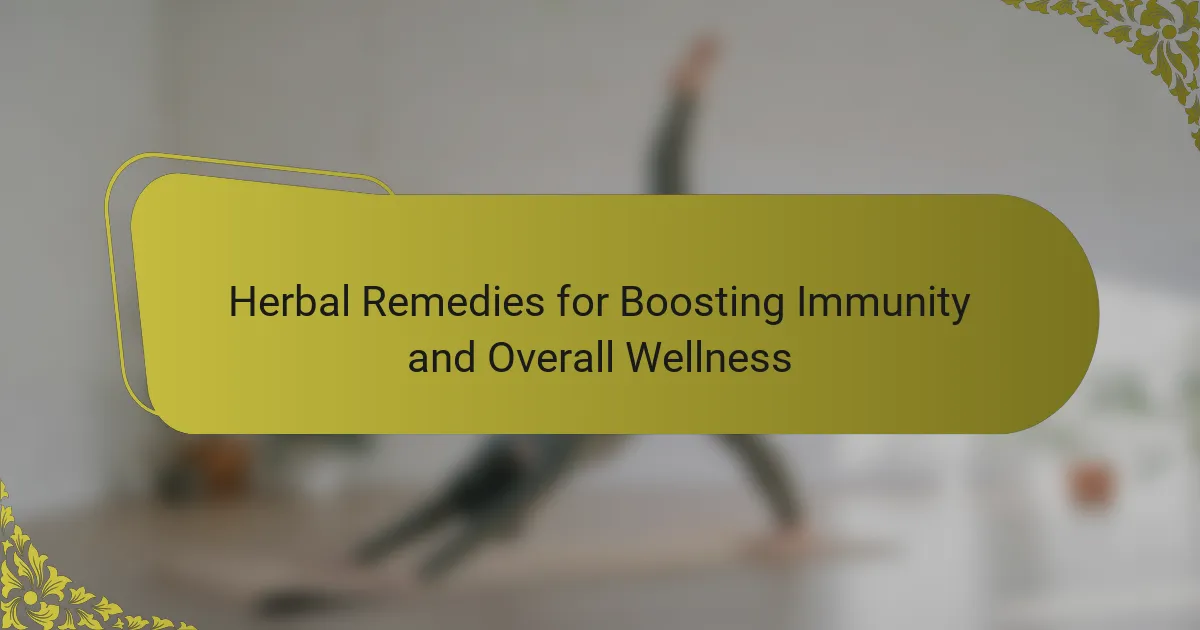Herbal remedies can significantly boost immunity and enhance overall wellness. They offer natural solutions to strengthen the body’s defenses, reduce inflammation, and promote health with fewer side effects than conventional medications. Key herbs like echinacea, elderberry, and turmeric provide immune support and energy enhancement. Understanding regional practices and expert tips can further optimize their benefits for long-term wellness.

What are the key benefits of herbal remedies for immunity and wellness?
Herbal remedies offer numerous benefits for boosting immunity and overall wellness. They enhance the body’s natural defenses, reduce inflammation, and promote overall health.
Common herbs like echinacea, elderberry, and turmeric are known for their immune-boosting properties. Echinacea can reduce the duration of colds, while elderberry is effective against viral infections. Turmeric contains curcumin, which has potent anti-inflammatory effects.
Using herbal remedies can also lead to fewer side effects compared to conventional medications. Many people report improved energy levels and better stress management through herbal supplementation.
Incorporating these remedies into daily routines can support long-term wellness and resilience against illnesses.
How do herbal remedies enhance immune function?
Herbal remedies enhance immune function by providing natural compounds that stimulate immune responses. For example, echinacea boosts white blood cell production, while elderberry is known for its antiviral properties. These remedies can reduce inflammation and promote overall wellness. Regular intake of herbs like garlic and ginger can further support immune health by improving circulation and reducing oxidative stress.
Which herbs are most effective for boosting immunity?
Herbs like echinacea, elderberry, and astragalus are effective for boosting immunity. Echinacea enhances immune response, elderberry fights viruses, and astragalus supports overall immune function. These herbs provide unique benefits that contribute to wellness. Regular intake can help maintain a robust immune system.
What role do antioxidants play in herbal immunity boosters?
Antioxidants enhance herbal immunity boosters by neutralizing free radicals, thus reducing oxidative stress. This process supports immune function and overall wellness. For example, herbs like echinacea and elderberry are rich in antioxidants, promoting better health outcomes. Antioxidants can also improve the absorption of essential nutrients, further strengthening the immune response.
How do herbal remedies contribute to overall wellness?
Herbal remedies significantly enhance overall wellness by boosting immunity and supporting various bodily functions. These natural solutions often contain antioxidants, vitamins, and minerals that strengthen the immune system. For example, echinacea is known for its ability to reduce the duration of colds and infections. Additionally, herbs like elderberry and ginger have anti-inflammatory properties, which contribute to overall health. Regular use of herbal remedies can lead to improved vitality and resilience against illnesses, making them a valuable part of a wellness routine.

What are the most popular herbal remedies for immunity?
Popular herbal remedies for boosting immunity include echinacea, elderberry, astragalus, and garlic. These herbs are known for their immune-enhancing properties and overall health benefits.
Echinacea is commonly used to prevent colds and respiratory infections. Studies show it can reduce the duration of illness. Elderberry is rich in antioxidants and may help reduce flu symptoms. Astragalus has been used in traditional medicine to enhance immune function and increase energy levels. Garlic contains allicin, which has antimicrobial properties and supports immune health.
Incorporating these herbs into your routine can contribute to better overall wellness and a stronger immune system.
Which herbal teas are best for immune support?
Herbal teas that best support immunity include echinacea, elderberry, ginger, and green tea. Echinacea enhances immune function, while elderberry offers antiviral properties. Ginger provides anti-inflammatory benefits, and green tea is rich in antioxidants. These herbal remedies contribute to overall wellness and can be easily incorporated into daily routines.
What are the benefits of echinacea for health?
Echinacea offers several health benefits, primarily boosting the immune system. It enhances the body’s ability to fight infections, particularly respiratory illnesses. Research indicates that echinacea can reduce the duration and severity of colds. Additionally, it possesses anti-inflammatory properties, which may alleviate symptoms associated with various ailments. Some studies suggest it also supports overall wellness by promoting better skin health and reducing anxiety.
How does elderberry support immune health?
Elderberry supports immune health by enhancing the body’s defense against viruses and infections. This herbal remedy contains antioxidants, particularly flavonoids, which help reduce inflammation and boost immune response. Research indicates that elderberry may shorten the duration of colds and flu symptoms. Additionally, elderberry’s unique attribute is its ability to inhibit viral replication, making it a potent ally for overall wellness.

How can herbal remedies be integrated into daily routines?
Integrating herbal remedies into daily routines enhances immunity and overall wellness. Start by selecting a few herbs known for their health benefits, such as echinacea, elderberry, and turmeric.
1. Morning Boost: Add turmeric to your morning smoothie or porridge for anti-inflammatory properties.
2. Tea Ritual: Brew herbal teas like ginger or chamomile throughout the day to support digestion and relaxation.
3. Supplementation: Consider herbal supplements, such as ashwagandha or reishi mushroom, to manage stress and boost immunity.
4. Cooking: Incorporate fresh herbs like basil and oregano into meals for added flavour and nutrients.
Consistency is key; integrate these practices gradually for the best results.
What are the best forms of intake for herbal remedies?
The best forms of intake for herbal remedies include teas, capsules, tinctures, and powders. Each method offers unique advantages for boosting immunity and overall wellness.
Teas provide a soothing experience and are easily absorbed. Capsules offer convenience and precise dosing. Tinctures deliver concentrated extracts quickly. Powders can be versatile, allowing for mixing into foods or drinks.
Choosing the right form depends on personal preference, desired benefits, and specific herbs used.
How do dosage and timing affect the effectiveness of herbs?
Dosage and timing significantly influence the effectiveness of herbal remedies. Proper dosage ensures optimal absorption and utilization of active compounds, while timing can enhance their impact on immunity and wellness. For instance, taking echinacea at the onset of cold symptoms can boost its immune-boosting effects. Additionally, some herbs, like ashwagandha, may provide better results when taken consistently over time. Factors such as individual metabolism and specific health conditions also play a role in determining the right dosage and timing for maximum benefits.
What are common recipes for herbal wellness?
Common recipes for herbal wellness include teas, tinctures, syrups, and infused oils. These preparations utilize various herbs known for their immune-boosting properties.
1. Herbal Tea: Steep echinacea or elderberry leaves in hot water for immune support.
2. Tincture: Combine alcohol with herbs like astragalus for a concentrated extract.
3. Syrup: Mix honey with ginger and lemon for a soothing, wellness-boosting syrup.
4. Infused Oil: Use olive oil infused with garlic and thyme for its antibacterial properties.
These recipes enhance overall wellness through natural ingredients, promoting health without synthetic additives.

What challenges might users face when using herbal remedies?
Users may face challenges such as inconsistent quality, potential side effects, and lack of scientific validation when using herbal remedies. These issues can lead to ineffective treatment or adverse reactions. Additionally, users may struggle with dosage and interactions with conventional medications, complicating their wellness journey. Understanding these challenges is essential for responsible use of herbal remedies.
How can interactions with medications affect herbal use?
Interactions with medications can significantly affect the efficacy and safety of herbal remedies. Certain herbs may enhance or inhibit the effects of medications, leading to unexpected results. For instance, St. John’s Wort can decrease the effectiveness of antidepressants, while garlic may enhance the effects of anticoagulants. Understanding these interactions is crucial for safe herbal use, especially for individuals on multiple medications. Always consult a healthcare professional before combining herbal remedies with prescribed treatments to avoid adverse effects.
What are the potential side effects of common herbal remedies?
Common herbal remedies can cause side effects, including digestive issues, allergic reactions, and interactions with medications. For example, echinacea may lead to gastrointestinal discomfort, while ginseng can affect blood sugar levels. Rarely, some herbs may cause liver damage. It’s essential to consult a healthcare professional before starting any herbal regimen to mitigate risks.
How can one identify quality herbal products?
To identify quality herbal products, examine sourcing, ingredient transparency, and certifications. Look for products that use organic ingredients and provide clear information about their origin. Third-party testing for potency and purity is essential for assurance of quality. Additionally, check for certifications like GMP or USDA Organic, which indicate adherence to quality standards.

How do regional practices influence the use of herbal remedies?
Regional practices significantly shape the use of herbal remedies for boosting immunity and overall wellness. Cultural beliefs, local flora, and traditional knowledge influence which herbs are favoured and how they are administered. For instance, in some regions, echinacea is popular for immune support, while others may prefer elderberry. These practices often reflect unique attributes of the local environment and health philosophies. Additionally, rare herbs may be utilized in specific regions due to their availability and traditional significance, enhancing the diversity of herbal applications.
Which cultural beliefs shape the use of herbal remedies in wellness?
Cultural beliefs significantly influence the use of herbal remedies in wellness. Many cultures view herbs as integral to health, often passed down through generations. Traditional practices, such as Ayurveda in India and Traditional Chinese Medicine, emphasize the balance of body and mind using specific herbs.
In some cultures, herbal remedies are associated with spiritual beliefs, enhancing their perceived efficacy. For instance, indigenous practices often incorporate rituals alongside herbal use, linking physical health to spiritual well-being. Additionally, the accessibility of local herbs shapes their use; communities tend to trust remedies derived from familiar plants.
The perception of herbal remedies as holistic solutions contributes to their popularity in wellness. Many believe these remedies provide fewer side effects compared to pharmaceuticals, reinforcing their cultural acceptance. This blend of tradition, spirituality, and perceived safety ensures that herbal remedies remain vital in many wellness practices worldwide.
How do local herbs vary in effectiveness across regions?
Local herbs vary in effectiveness across regions due to differences in climate, soil composition, and traditional practices. For instance, echinacea is more potent in the Midwest U.S. than in other areas. Regional adaptations also influence the chemical profiles of these herbs, impacting their medicinal properties. Local knowledge and usage patterns further shape the effectiveness of herbal remedies, as communities often select plants best suited to their specific health needs.

What expert tips can enhance the effectiveness of herbal remedies?
To enhance the effectiveness of herbal remedies for boosting immunity and overall wellness, consider the following expert tips.
1. Choose high-quality herbs sourced from reputable suppliers to ensure potency and purity.
2. Tailor remedies to individual health needs by consulting with a qualified herbalist or healthcare provider.
3. Combine herbs synergistically; for instance, mixing echinacea with elderberry can amplify immune-boosting effects.
4. Maintain consistency in dosage and duration for optimal results; a common regimen lasts 4-6 weeks.
5. Monitor for any adverse reactions and adjust dosages or discontinue use if necessary.
What common mistakes should be avoided when using herbal remedies?
Avoiding common mistakes when using herbal remedies is crucial for maximizing their benefits. First, ensure you consult with a healthcare professional before starting any herbal regimen. Misunderstanding dosages can lead to ineffective results or adverse effects. Additionally, relying solely on herbal remedies without a balanced diet and lifestyle may hinder overall wellness. Always research the specific herbs you intend to use, as some may interact negatively with medications. Lastly, be cautious of sourcing; low-quality herbs can diminish effectiveness and safety.
How can lifestyle changes amplify the benefits of herbal wellness?
Lifestyle changes significantly enhance the benefits of herbal remedies for immunity and overall wellness. Integrating a balanced diet, regular exercise, and adequate sleep with herbal intake maximizes their effectiveness. For example, consuming vitamin-rich foods alongside echinacea can strengthen immune response. Additionally, stress management techniques like meditation can amplify the calming effects of chamomile. These lifestyle modifications create a synergistic effect, leading to improved health outcomes.
What are best practices for sourcing and using herbs?
To effectively source and use herbs for boosting immunity and overall wellness, follow these best practices.
1. Research reputable sources for herbs, focusing on organic and sustainably sourced options.
2. Consult with a qualified herbalist or healthcare professional to ensure safe usage.
3. Use herbs in various forms, such as teas, tinctures, or capsules, to suit personal preferences.
4. Start with small doses to assess individual reactions and gradually increase as needed.
5. Combine herbs known for their immune-boosting properties, like echinacea and elderberry, for enhanced effects.
